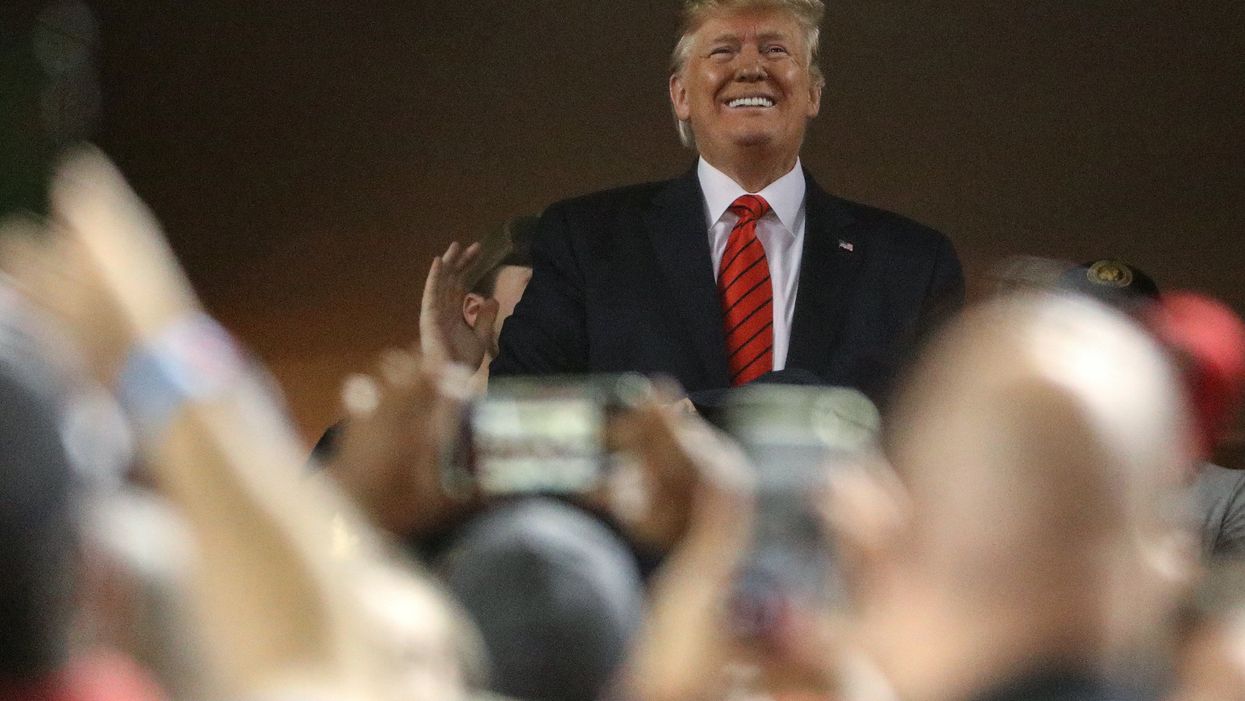Mintz is the author of "Beyond Happiness and Meaning: Transforming Your Life Through Ethical Behavior" and a former dean of the College of Business and Public Administration at Cal State University in San Bernardino.
Were you watching when President Trump was booed after being introduced at Game 5 of the World Series at Nationals Park? Chants of "lock him up" made me think about the decline of civility in society, which the president contributes to on Twitter almost daily.
Trump was a victim of his own disrespectful behavior, having prompted his audiences to chant "lock her up" during his campaign against Hillary Clinton. The point is uncivil behavior begets more uncivil behavior and before you know it, all of society has been infected.
Trump routinely criticizes those who disagree with him or say anything that portrays him in an unflattering way. He uses his bully pulpit to bully others rather than to bring our divided country together and promote civic discourse.
Political dialogue is the main cause of the lack of civic discourse in the public arena. Partisanship has replaced objective debate. It's fueled by each political party working to make the other look as bad as possible. It's an "us against them" mentality and the public loses in the end. Nothing of substance gets done because politicians are so busy digging up dirt on their opponents and playing to their political base.
Social media is the main cause of the lack of civility in society. The temptation to type a few words to vent at someone who said or did something objectionable is all too tempting for many. The tirade's recipient wants revenge and so replies without any thought of the consequences. These exchanges go viral and bad behavior is normalized. What's needed to restore civil discourse is to learn how to disagree with each other without being disagreeable.
A lot has been written recently about our "cancel culture," where someone says or does something that's captured online and then gets denounced online by those who object. The goal is to cut the initial messenger off from influence. The guilty party is shunned from society. Being cancelled can cost friends, coworkers, a job or even a career.
Cancel culture and what to do about it is a multi-dimensional problem. There are some who should be canceled such as Harvey Weinstein, Bill Cosby and others who have said and done disgraceful things. The ever-increasing pictures of politicians, entertainers and others depicted in blackface is another example. Appearing in blackface or any other cultural insensitivity is wrong at any age. Just because someone did it when they were younger and immature doesn't excuse it. It shows poor judgment, a lack of empathy and gross insensitivity to what other people have had to endure.
I don't agree, however, that those who post offensive comments should be automatically cancelled. Such people need to be challenged on their ideas. How will we ever promote civilized discourse if we don't start talking to each other and resist the temptation to dismiss them because of their words or deeds? Let's call them out but also try to change their behavior in a productive way.
Former President Barack Obama chimed in recently about the cancel culture, saying that being judgmental about other people is not activism or helping to bring change. He likened it to casting stones. No doubt he's on to something, but we need to understand that this is one way for millennials to communicate their feelings and vent their frustration. They lead their lives on social media so it shouldn't be surprising that they turn to it to voice their disgust about someone else's words or behavior. It's a form of online activism.
We need to be more forgiving and less judgmental of others. We live in a time where
insults and accusations overwhelm honesty and integrity. We've forgotten the lesson of Stephen Covey's "Seven Habits of Highly Effective People" that says we should "Seek first to understand, then to be understood." Unfortunately, all too many seek first to criticize and judge.
Nothing will change unless our leaders change, and hearing the tenor of the debate in Congress over political matters, such as whether Trump should be impeached, gives me little hope the problem will be solved anytime soon. It doesn't matter what side of the issue you come down on. In Washington, it's a "gotcha" culture that fosters tit-for-tat behavior.
This is not what the Founders had in mind. They developed fundamental principles and civic virtues as the foundation of our government, but that is crumbling under the weight of acrimonious exchanges. We've lost sight of the basic virtues that reflect universal principles of moral and ethical excellence essential to living a good life and promoting effective, representative government. Things like basic kindness, respect for others and a generosity of spirit.
Can we reverse course? I'm not optimistic, but one thing that might help is for debate moderators to ask the Democratic presidential candidates to opine on how we can bring civility back to society. No one seems to want to discuss it, which is a sign incivility has been normalized by society.
To solve a problem, much like alcoholism and drug dependency, we first have to admit there is one, and it doesn't seem that will occur anytime soon.



















Marco Rubio is the only adult left in the room